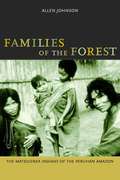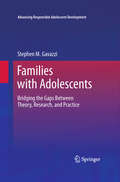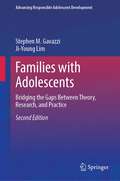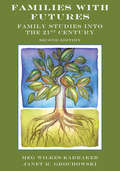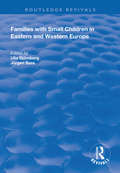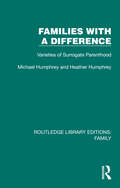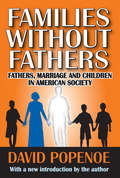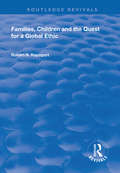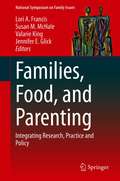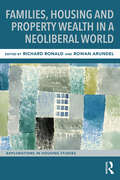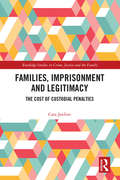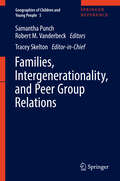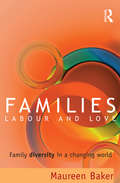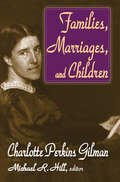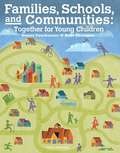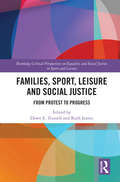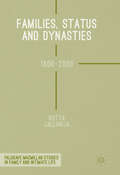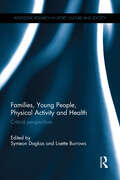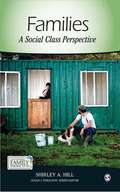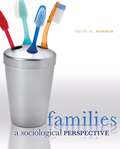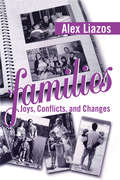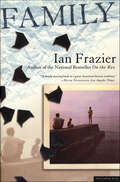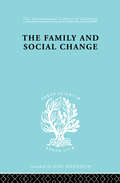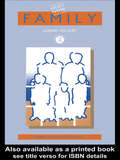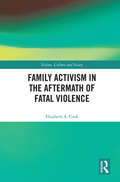- Table View
- List View
Families of the Forest: The Matsigenka Indians of the Peruvian Amazon
by Allen W. JohnsonAn ethnographic account of how and why a native American people live in autonomous, self-sufficient family groups along the Amazon fringe in the foothills of the Peruvian Andes.
Families with Adolescents
by Stephen GavazziThis book focuses a unique panoramic lens on the study of adolescent development. It offers a clear blueprint for more consistently improved practice, emphasizing family process and structure instead of individual developmental stages.
Families with Adolescents: Bridging the Gaps Between Theory, Research, and Practice (Advancing Responsible Adolescent Development)
by Stephen M. Gavazzi Ji-Young LimThe second edition of this book offers an expanded and updated blueprint for more consistently improved practice, emphasizing family process and structure instead of only individual developmental stages. Its chapters deftly summarize the recent knowledge base about families with adolescents and explains how to apply these results across mental health and social services disciplines. The new edition clearly illustrates family concerns and theoretical perspectives through real-world vignettes and cogent use of family assessment measures. Chapters offer a broad understanding of how diversity in all its forms – including race/ethnicity, culture, religion, and sexual orientation – has created a much more nuanced understanding of how families with adolescents are able to function within their environment. Both major challenges to families and communities form the backdrop of the second edition’s focus on forecasting in which the theoretical, empirical, and intervention literatures necessarily move in service to the health and well-being of families with adolescents.Featured topics include: Central concepts of family development, family systems, ecological, attachment, and social learning theories in relation to families with adolescents. Influence of the family on adolescent problem behavior, mental health concerns, substance use issues, educational attainment, and social competence outcomes. Selected studies on parenting behaviors, conflict resolution, and other major aspects of families with adolescents. Application topics in family-based intervention and prevention programs. Integrating theory, research, and applications to create a “triple threat” model. Diversity issues surrounding race/ethnicity, culture, religion, and sexual orientation. Families with Adolescents, Second Edition, is an essential resource for researchers, professors, and graduate and advanced undergraduate students as well as professionals and other mental health clinicians, practitioners, and therapists in clinical child and developmental psychology, family studies, human development, sociology, social work, education, and all allied disciplines.
Families with Futures: Family Studies into the 21st Century, Second Edition
by Janet R. Grochowski Meg Wilkes KarrakerNoted for its interdisciplinary approach to family studies, Families with Futures provides an engaging, contemporary look at the discipline's theories, methods, essential topics, and career opportunities. Featuring strong coverage of theories and methods, readers explore family concepts and processes through a positive prism. Concepts are brought to life through striking examples from everyday family life and cutting-edge scholarship. Throughout, families are viewed as challenged but resilient. Each chapter opens with a preview of the chapter content and concludes with key terms and varied learning activities that promote critical thinking. The activities include provocative questions and exercises, projects, and interactive web activities. Boxes feature authentic voices from scholars and practitioners (including CFLEs) from a variety of disciplines including family studies, sociology, psychology, and more. These boxes provide a firsthand look at what it is like to work in the field. The book concludes with a glossary defining each chapter's boldfaced key terms.Updated throughout, the new edition features new coverage of: The latest family theories including feminist theory and postmodernism Immigrant and transnational families in the 21st century Physiology, psychology, and sociology of intimacy and sexuality Effects of recent health and other policy decisions on families Care giving in families, especially in later life Family finances, with an emphasis on the recent economic downturns Career opportunities in family studies. The new Instructor's Resource website features test questions, PowerPoint slides, chapter outlines, news bulletins of current events, hotlinks to helpful tools such as the NCFR's Ethical Principles and Guidelines, and more. This is an ideal text for upper-level undergraduate and lower-level graduate courses in family studies, family ecology, and family science offered in departments of family and consumer sciences, human development, psychology, and sociology.
Families with Small Children in Eastern and Western Europe (Routledge Revivals)
by Ulla Björnberg Jürgen SassPublished in 1997, the aim of this study is to address comparative perspectives on gender and family life in western and eastern Europe. The focus is on the way in which family policy measures relating to the reconciliation of work and family are viewed and used by employed parents with small children. Another purpose is to consider how compatibility between family and employment is perceived by the parents, and its implications for partnership, gender balance, and parent-child relationships. The book also discusses the consequences and lessons which can be drawn from these studies for the purpose of family policy initiatives.
Families with a Difference: Varieties of Surrogate Parenthood (Routledge Library Editions: Family)
by Michael Humphrey Heather HumphreyIn the 1980s families other than those made up of the natural mother, father, and siblings were increasing in number. Originally published in 1988, this book looks at these ‘alternative’ families and considers the psychological and social consequences of growing up in a family where the genetic link between parents and children is missing or incomplete. The authors discuss adoption, fostering, stepfamilies, and parenthood by donor insemination, as well as such areas as ‘womb-leasing’ and homosexual parenthood, considered controversial at the time. A recurring theme is whether, when, and what to tell children of their extrafamilial origins, and how they and other family members react to the knowledge. Families with a Difference is a comprehensive new analysis of the changing nature of family life in western society which, in the aftermath of the influential Warnock Report in 1984, would have been important reading for students and professionals in social policy, social work, psychology, and the social aspects of medicine.
Families without Fathers: Fatherhood, Marriage and Children in American Society
by David PopenoeThe American family is changing. Divorce, single parents, and stepfamilies are redefi ning the ways we live together and raise our children. Many "experts" feel these seemingly inevitable changes should be celebrated; they claim that the "new" families, which often lack a strong father, are actually healthier than traditional two-parent families—or, at the very least, do children no harm. But as David Popenoe shows in Families Without Fathers this optimistic view is severely misguided. Examining evidence from social and behavioral science, history, and evolutionary biology, Popenoe shows why fathers today are deserting their families in record numbers. The disintegration of the child-centered, two parent family—especially in the inner cities, where as many as two in three children are growing up without their fathers—and the weakening commitment of fathers to their children that more and more follows divorce, are central causes of many of our worst individual and social problems. Juvenile delinquency, drug and alcohol abuse, teenage pregnancy, welfare dependency, and child poverty can be directly traced to fathers' lack of involvement in their children's lives. Our situation will only get worse, Popenoe warns, unless men are willing to renew their commitment to their marriages and to their children. Yet he is not just an alarmist. He suggests concrete policies, and new ways of thinking and acting that will help all fathers improve their marriages and family lives, and tells us what we as individuals and as a society can do to support and strengthen the most important thing a man can do.
Families, Children and the Quest for a Global Ethic (Routledge Revivals)
by Robert N. RapoportPublished in 1997, this volume looks at the role of families in the world order and the problems facing them especially in the face of globalization. The author takes into account materialist, religious, gender and environmental concerns.
Families, Food, and Parenting: Integrating Research, Practice and Policy (National Symposium on Family Issues #11)
by Valarie King Susan M. McHale Jennifer E. Glick Lori A. FrancisThis book examines the many roles of families in their members’ food access, preferences, and consumption. It provides an overview of factors – from micro- to macro-levels – that have been linked to food insecurity and discusses policy approaches to reducing food insecurity and hunger. In addition, it addresses the links between food insecurity and overweight and obesity. The book describes changes in the U.S. food environment that may explain increases in obesity during recent decades. It explores relationships between parenting practices and the development of eating behaviors in children, highlighting the importance of family mealtimes in healthful eating. The volume provides an overview of efforts to prevent or reduce obesity in children, with attention to minority populations and discusses research findings on targets for obesity prevention, including a focus on fathers as change agents who play a crucial, yet understudied, role in food parenting. The book acknowledges that with the current obesigenic environment in the United States and elsewhere around the world, additional and innovative efforts are needed to foster healthful eating behavior and orientations toward food in childhood and in families. This book is a must-have resource for researchers, professors, clinicians, professionals, and graduate students in developmental psychology, family studies, public health as well as numerous interrelated disciplines, including sociology, demography, social work, prevention science, educational policy, political science, and economics.
Families, Housing and Property Wealth in a Neoliberal World (Explorations in Housing Studies)
by Richard Ronald Rowan ArundelThe twenty-first century has so far been characterized by ongoing realignments in the organization of the economy around housing and real estate. Markets have boomed and bust and boomed again with residential property increasingly a focus of wealth accumulation practices. While analyses have largely focussed on global flows of capital and large institutions, families have served as critical actors. Housing properties are family goods that shape how members interact, organise themselves, and deal with the vicissitudes of everyday economic life. Families have, moreover, increasingly mobilized around their homes as assets, aligning household transitions and practices towards the accumulation of property wealth. The capacities of different families to realise this, however, are highly uneven with housing conditions becoming increasingly central to growing inequalities and processes of social stratification. This book addresses changing relationships between families and their homes over the latest period of neo-liberalization. The book confronts how transformations in households, life-course transitions, kinship and intergenerational relations shape, and are being shaped by, the shifting role of property markets in social and economic processes. The chapters explore this in terms of different aspects of home, family life and socioeconomic change across varied national contexts.
Families, Imprisonment and Legitimacy: The Cost of Custodial Penalties (Routledge Studies in Crime, Justice and the Family)
by Cara JardineThis book examines what it means to be a family within the restrictive, disruptive, and often distressing context of imprisonment. Drawing on original qualitative data, it looks beyond traditional models of the family to examine the question of which relationships matter to individuals affected by imprisonment, and demonstrates how family relationships are actively constructed and maintained through family "practices" and "displays" such as visits, shared experiences and continuing family memories and traditions. It sheds new light not only on the true extent of who is impacted by the imposition of a prison sentence, but also the barriers to family life that these individuals encounter throughout its duration.This book also contributes to our understanding of wider issues such as poverty and social marginalisation, the role of family relationships on desistance from crime, and legitimacy. It argues that the act of supporting an individual in custody can bring families into regular contact with the criminal justice system in ways that can be both distressing and problematic, and therefore contends that the prison system should minimise the damage caused by imprisonment not only to family relationships, but also to the perceived legitimacy of the criminal justice system.Generating new conceptual insights into the harms of imprisonment and how perceptions of legitimacy and fairness are shaped by the criminal justice system, this book will be of much interest to students of criminology and sociology engaged in studies of criminal justice, prisons, gender, social work, and punishment. It will also be of interest to policy makers, penal-reformers, and activists.
Families, Intergenerationality, and Peer Group Relations
by Tracey Skelton Samantha Punch Robert M. VanderbeckThis volume addresses children and young people’s relationships both within and beyond the context of the family. It begins with familial relationships and the home by examining the social and cultural complexities of families, intimacies and interdependencies, including the dynamics of families as spatial units (nuclear, multi-generational, alternative) and the roles that children play (as carers etc.). In addition to considering child/parent relations, sibling relationships and birth order, the initial section includes particular dimensions of children's familial relationships in diverse contexts, such as family food practices, aspirations and work practices. The second section explores geographical dimensions of adult/child relationships beyond the dynamics of the family and across the lifecourse. It considers the roles that intergenerationality plays in children's and young people's lives as well as their links with wider communities. The section addresses broader conceptual issues and themes (child-adult relationships outside the home; intergenerational geographies and spaces; and the intergenerational city) while also providing more focused discussions of current issues related to the geographies of intergenerationality including adoption, looked after children and fertility. The final section addresses children and young people's relationships with one another: friendship, peer group relations, and sexualities. It explores the geographies and spatialities of affective relations and emotional practices among children and young people. Geographies of bodies and embodiment and their connection to identities is an important part of this section. The chapters range from cross-cultural comparisons of age mixing among children to specific kinds of relationship formations between children and young people (e.g. friendship; sexual relations; gangs; bullying) and the spaces and places (including cyberspace) that facilitate, impede and organise these relationships. The diverse relationships that children and young people form with both one another and with adults have significant geographical dimensions.
Families, Labour and Love: Family diversity in a changing world
by Maureen BakerWe think of our family life as very personal, but in fact it is shaped by influences well beyond our control. Families, Labour and Love identifies the ways in which family and personal life in three 'settler' societies - Australia, New Zealand and Canada - has been shaped by colonisation, immigration, globalisation, demographic changes, law and policy.Baker shows that these three countries, each a former colony, developed similar family trends and similar family policies. Strongly gendered patterns of paid and unpaid work played a major role in family life. The family practices of indigenous people were largely overlooked, as were those of recent immigrant groups. However local conditions also produced significant differences in family experiences among the three countries.Richly illustrated with examples, comparative data and textual sources, Families, Labour and Love provides a broad-ranging analysis of the family which will appeal to students, researchers and policy-makers.Maureen Baker outlines with great clarity the diversity of families and the way in which they are shaped by historical and cultural forces. The focus on Australia, New Zealand and Canada is not only refreshing but throws into sharp relief the impact on contemporary families of the colonial experience, industrialisation, large scale immigration and globalisation.David de Vaus, La Trobe University
Families, Marriages, and Children
by Charlotte Perkins GilmanCharlotte Perkins Gilman (1860-1935) was a pioneering sociologist, feminist pragmatist, author, and lecturer. A skilled and perceptive writer, she explained sociological concepts and principles clearly and concisely to popular audiences. This volume presents a focused and provocative set of Gilman's penetrating analyses of marriage, motherhood, and family relationships. Generally unavailable, except in archives and special libraries, the lion's share of the analyses are drawn directly from Gilman's quintessentially unique self-published journal, The Forerunner. Transcending her era, Gilman speaks with wit, insight, and candor to twenty-first century readers about many controversial aspects of family and family life. She believes deeply that women's values-regeneration, cooperation, and compassion-make for better societies. Men's values, she concludes, are destructive, competitive, and often violent. Families produce double standards and inequalities between husbands and wives, resulting in inferior mothers and, as a direct consequence, in substandard children. To improve society, Gilman argues, we need healthy, happy children. This requires well-trained, competent mothers, widespread social parenting, and enlightened, non-patriarchal marriages. Largely self-taught, Gilman supported herself through writing and lecturing. She was at one time a settlement house leader and an active member of the American Sociological Society. Her wide sociological circle included lasting friendships with Jane Addams, Edward A. Ross, and Lester F. Ward.
Families, Schools And Communities: Together For Young Children
by Donna Couchenour Kent ChrismanFAMILIES, SCHOOLS, AND COMMUNITIES: TOGETHER FOR YOUNG CHILDREN, 5th Edition, emphasizes the role of families and communities in children's education, and is geared to meeting national standards in teacher preparation programs. Content reflects current research and best practices in education. Divided into two sections, this book helps you understand contemporary families and provides you with the skills that you will need to build relationships with families and the community. You'll find specific ideas and strategies for increasing family involvement in the community and schools, encouraging learning at home, working with military families, recognizing family strengths, diversity in the classroom, and many other topics. New content includes integration of current standards and a new video feature as well as expanded material on advocacy, technology, and strategies for dealing with parents. Available with InfoTrac Student Collections http://gocengage.com/infotrac.
Families, Sport, Leisure and Social Justice: From Protest to Progress (Routledge Critical Perspectives on Equality and Social Justice in Sport and Leisure)
by Ruth Jeanes Dawn E. TrussellThrough a social justice and equity lens, this book examines how families, sport, and leisure connect to broader social issues in society. It goes beyond describing oppression and disadvantaged identities and focuses on advocacy and ways forward to challenge the status quo. Adopting an interdisciplinary approach, the book draws upon different theories to present important new work on topics as diverse as the role of parents and siblings within youth sport; the family in sport for development and peace; and grandparent–grandchild relationships in sport, leisure, and family tourism. Several topics also bring attention to the multiplicity of family lives such as LGBTQ older adults as well as children and young people in the care of the state. Together, these studies provide important insight into how sport and leisure reflect and refract key contemporary social issues within the context of familial lives. This is fascinating reading for any student or researcher with an interest in sport, leisure, education, development, sociology, social work, or social policy.
Families, Status and Dynasties
by Riitta JallinojaThis book takes a novel approach to family, exploring in detail how status is inherited and maintained within families; the process of upward social mobility; and how the roots of social decline start within families. The author also examines how rigidly status equivalence determines choice of spouse. Exceptionally extensive in its coverage, the book ranges from the seventeenth century to the present day, across a large range of European countries and part of the United States, and across several class groups, including royalty, nobility and entrepreneurial dynasties, as well as families of professionals, artists and those in lower ranks. The book also discusses the viability of the central sociological concepts of class and status. The book will be of interest to scholars and students in the areas of family sociology, history, social equality and inequality and class and elitism research.
Families, Young People, Physical Activity and Health: Critical Perspectives (Routledge Research in Sport, Culture and Society)
by Lisette Burrows Symeon DagkasThe family is an important site for the transmission of knowledge and cultural values. Amidst claims that young people are failing to follow health advice, dropping out of sport and at risk of an ever-expanding list of lifestyle diseases, families have become the target of government interventions. This book is the first to offer critical sociological perspectives on how families do and do not function as a pedagogical site for health education, sport and physical activity practices. This book focuses on the importance of families as sites of pedagogical work across a range of cultural and geographical contexts. It explores the relationships between families, education, health, physical activity and sport, and also offers reflections on the methodological and ethical issues arising from this research. Its chapters discuss key questions such as: how active living messages are taken up in families; how parents perceive the role of education, physical activity and sport; how culture, gender, religion and social class shape engagement in sport; how family pedagogies may influence health education, sport and physical activity now and in the future. This book is essential reading for anyone with an interest in health, physical education, health education, family studies, sport pedagogy or the sociology of sport and exercise.
Families: A Social Class Perspective
by Shirley A. HillThis book focuses on the impact of economic systems and social class on the organization of family life. Since the most vital function of the family is the survival of its members, the author give primacy to the economic system in structuring the broad parameters of family life. She explains how the economy shapes the prospects families have for earning a decent living by determining the location, nature, and pay associated with work.
Families: A Sociological Perspective
by David M. NewmanFamilies: A Sociological Perspective successfully connects to students' personal lives while showing how sociologists understand and explain families. It is not only informative in terms of current sociological knowledge of families, but meaningful in terms of contemporary family debates and applicable to students' own family experiences. "What Does it All Mean?", "Going Global", and "See for Yourself" sections appear throughout the text allowing students to think and actively "do" sociology like sociologists to explore theoretical concepts to better understand their own family lives as well as those of others.
Families: Joys, Conflicts, and Changes
by Alex LiazosUnlike other family textbooks that mostly emphasize conflicts and problems, this book also features the joys and pleasures of family living and its mutually nourishing qualities. Its perspective reflects polls, surveys, and student essays indicating that most people value their families. Families everywhere provide love, support, and sustenance to their members, but they do so in many different arrangements.Understanding the wide variety of families historically and across cultures gives the student a better basis for understanding how families change and a better grasp of more controversial changes such as the gradual acceptance by Westerners of same-sex marriage and child-rearing by single people. Liazos offers two poignant chapters not found in other texts. Family Living (Chapter Six) focuses on the social value of caregiving and family meals. Kin and Community (Chapter Seven) focuses on relationships among kin and the larger community.
Family
by Ian FrazierWith wit and an unerring eye for detail, acclaimed author Ian Frazier takes readers on a journey through his family's story, his nation's history, and himselfUsing letters and other family documents, Frazier reconstructs two hundred years of middle-class life, visiting small towns his ancestors lived in, reading books they read, and discovering the larger forces of history that affected them. He observes some of them during the British raid on Danbury, Connecticut, in the Revolutionary War; he follows others west as they pioneer in the wilderness of Ohio and Indiana; he visits the battlefields where they fought the Civil War. Frazier interviews old-timers, uncles, aunts, cousins, maids, and a beer-store owner who knew his dad. He pursues the family saga in aspect from trivial to grand, hoping for "a meaning that would defeat death." Family is a poetic epic of facts, a chronicle of Protestant culture's rise and fall, a memorial, and a revised view of American history as romantic as it is cold-eyed.“Mr. Frazier, in this remarkable history of an unremarkable family, plays both roles, the gossip and the pedant, balances skillfully, then adds his own insights as a loyal family member.” —David Willis McCullough, The New York Times Book Review
Family & Social Change Ils 127: A Study Of Family And Kinship In A South Wales Town (International Library of Sociology)
by Christopher Harris Colin RosserFirst Published in 1998. Routledge is an imprint of Taylor & Francis, an informa company.
Family (Society Now)
by Adrian WilsonAdrian Wilson provides a comprehensive introduction to the study of the family. The book opens with a chapter on family structure, looking at the family historically and in cross-cultural perspective. Following this is a review first of theoretical approaches to the family, including functionalist, feminist, Marxist and radical criticism, and second, how the family is studied sociologically. Chapters 4 and 5 look at the changing British family and British families today, and the concluding chapters examine family problems, for example, divorce, violence, one -parent families, and the family and the state.
Family Activism in the Aftermath of Fatal Violence (Victims, Culture and Society)
by Elizabeth A. CookFamily Activism in the Aftermath of Fatal Violence explores how family and family activism work at the intersection of personal and public troubles and considers what influence family testimonies of fatal violence can have on matters of crime, justice, and punishment. The problem of fatal violence represents one end of a long continuum of violence that marks society, the effects of which endure in families and friends connected through ties of kinship, identity and social bonds. The aftermath of fatal violence can therefore be an intensely personal encounter which confronts families with disorder and uncertainty. Nevertheless, bereaved families are often found at the forefront of efforts to expose injustice, rouse public consciousness, and drive forward social change that seeks to prevent violence from happening again. This book draws upon ethnographic research with those bereaved by gun violence who became involved in family activism in the context of fatal violence: namely, the attempts by bereaved families to manage their experiences of violent death through public expressions of grief and become proxies for wider debates on social injustice. This is an ever more pressing issue in a landscape which increasingly sees the delegation of responsibility to families and communities that are left to deal with the aftermath of violence. An accessible and compelling read, this book will appeal to students and scholars of criminology, sociology, cultural studies, and all those interested in learning more about the after-effects of fatal violence.
